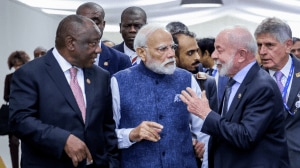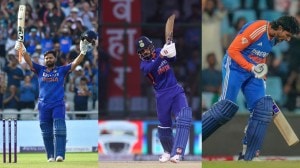UPA-Left rift puts question mark on Somnath as Speaker
With the UPA and Left poised for a break-up, speculation has begun over the continuation of Somnath Chatterjee as Speaker of the Lok Sabha.

With the UPA and Left poised for a break-up, speculation has begun over the continuation of Somnath Chatterjee as Speaker of the Lok Sabha.
Even though the CPI(M) had decided to lend only outside support to the UPA Government after the 2004 Lok Sabha polls and had resolved to steer clear of any executive role in the new dispensation, it agreed to “spare” Chatterjee considering his “experience” in Parliament. At the end of the day, Chatterjee’s ascendance to the post emerged as the most profound demonstration of the cementing of the UPA-Left tie-up inside the Lok Sabha.
This arrangement is set for a complete reversal now that the Left has vowed to withdraw support if the UPA goes ahead to clinch a safeguards agreement with the International Atomic Energy Agency (IAEA). Ironically, Chatterjee, the symbol of the UPA-Left unity would be called upon to preside when the Left votes against the UPA.
There has been a sea change since Chatterjee was elected unanimously, with as many as 17 parties seconding his name for the job, but it can be argued that the Speaker is supposed to function in a non-partisan manner and therefore, there is no reason for him to step down even if his party withdraws support from the Government.
However, the CPI(M) will have to prepare for taunts from the BJP, which is bound to cite Chatterjee’s continuation to question the party’s sincerity in opposing the nuclear deal.
Nonetheless, it is the CPI(M) leadership which has to actually take the final call, and though Chatterjee is the longest serving party MP — 10 terms in the Lok Sabha with just one break in between, as well as serving as the floor leader of the party for 15 years owing to his excellent Parliamentary skills — he has not enjoyed a matching position within the party organisation. His inclusion in the Central Committee, the highest decision-making body of the party, came quite late in the day, and once he was elected Speaker, he had to resign from it.
While his proximity to Jyoti Basu and West Bengal Chief Minister Buddhadeb Bhattacharjee vis-à-vis CPI(M) general secretary Prakash Karat has ensured Chatterjee’s successive electoral victories, he has been faced with a certain disadvantage for the same reason. For example, the party leadership had shot down a proposal for his nomination for the Presidency after the retirement of A P J Abdul Kalam, even though he was expected to attract a much wider acceptance and support than Pratibha Patil.








- 01
- 02
- 03
- 04
- 05























